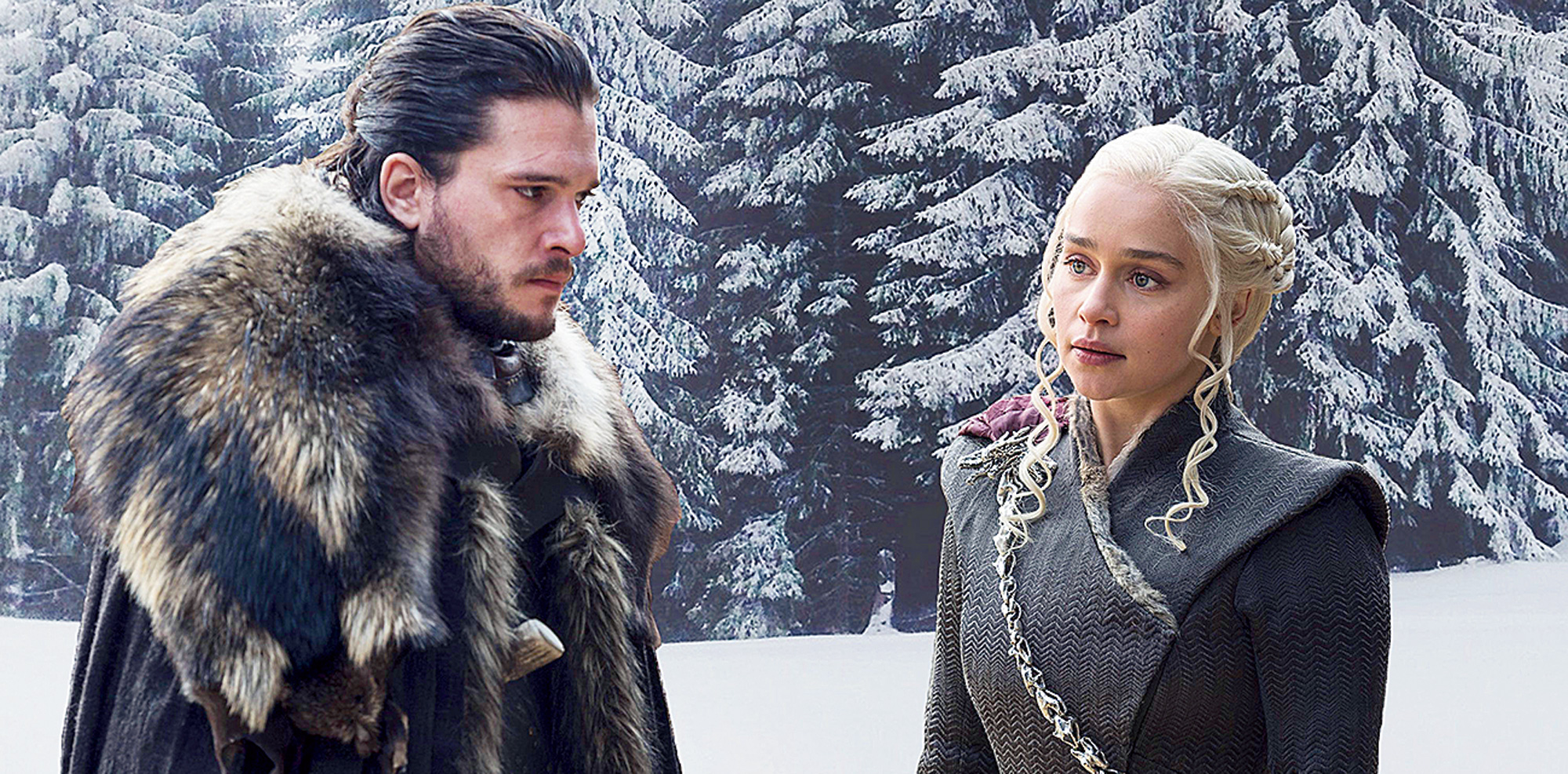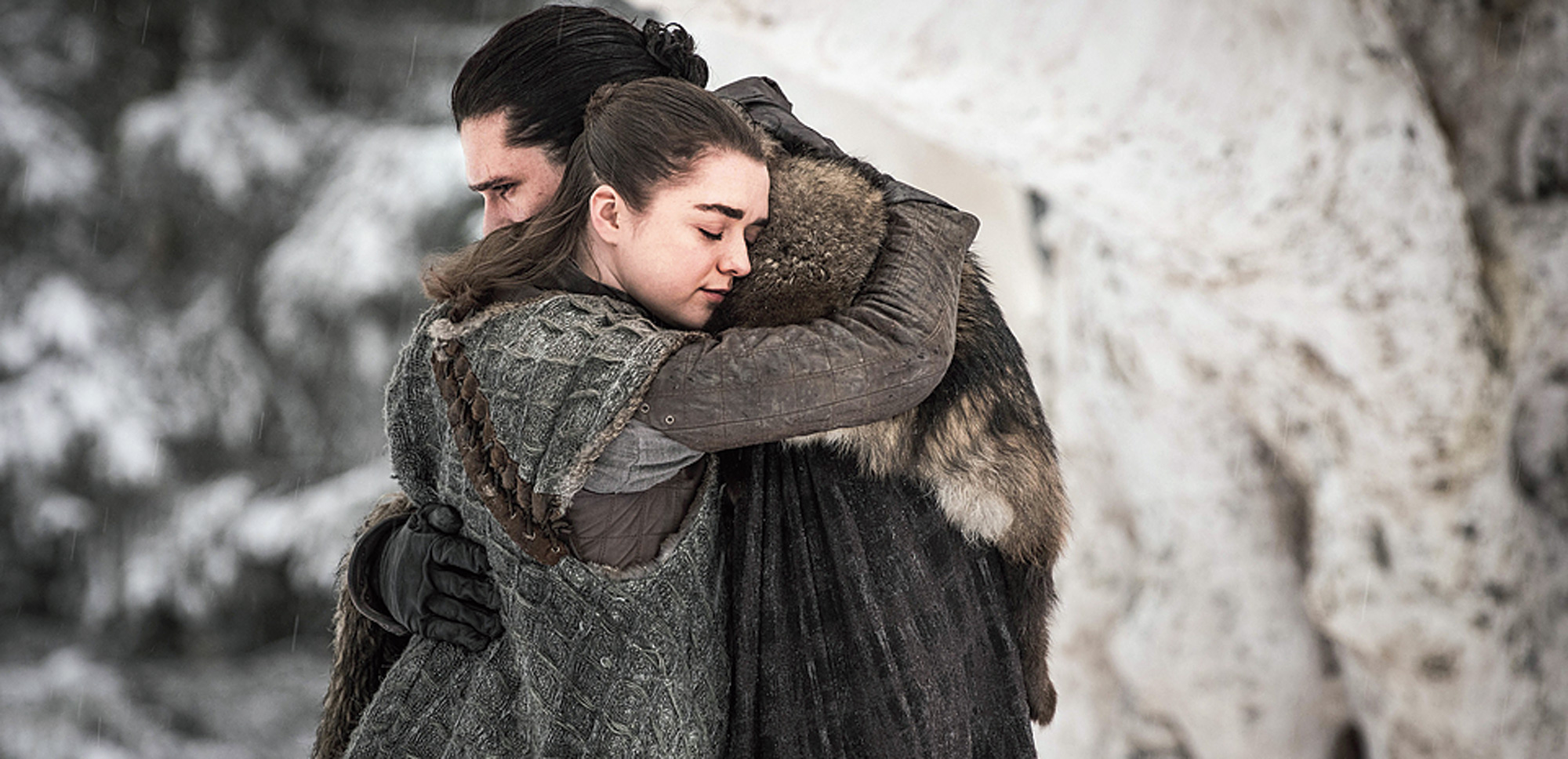When Game of Thrones finally wraps up on May 19, at least one of the story’s central figures would like the end to be the actual end. “Why [expletive] with it?” Emilia Clarke, the Dragon Queen herself, said recently. “It’s a phenomenon that no one ever saw coming, so I completely understand why anyone would be like, let’s make 1,500 more since that’s a recipe that works,” she added. “I just don’t think they should.”
Pop culture trends and market pressures might ultimately work against her, however, and a prequel pilot is already in the works. So as HBO’s biggest ever hit begins its final season, a definitional question hangs over its future: Is Game of Thrones a series? Or is it a universe?
Based on viewing, industry impact and global attention, Thrones is one of the biggest blockbusters in TV history. But as giant corporations buy one another and plan bottomless new streaming platforms in an ever more feverish battle for your eyeballs and entertainment dollars, blockbusters are not enough anymore.
So while there are only six episodes remaining in the sprawling saga of Jon Snow, Daenerys Targaryen, Tyrion and friends, we’ve likely only begun exploring Westeros.
POP-CULTURE PHENOMENON
Consider Star Wars. Since Disney bought Lucasfilm in 2012 for $4 billion, it has strip-mined the franchise, conceiving multiple movie trilogies, stand-alone films and TV series, as well as an enormous presence in Disney’s theme parks. (Next up for the Thrones creators David Benioff and D.B. Weiss: A series of Star Wars films.)
Or Harry Potter (like Game of Thrones, part of the WarnerMedia empire), which after the eight films based on the books is now deep into the Fantastic Beasts prequel series, and also has tourist attractions all over the world.
Or the mightiest pop culture universe of all: Disney’s Marvel, which later this month will close out the Avengers filament of the Marvelverse, with Avengers: Endgame, but in June extend the X-Men branch with Dark Phoenix, starring Sansa Stark herself, Sophie Turner.
So wouldn’t the phenomenally popular (and lucrative) Game of Thrones be a prime candidate for a similar treatment? The case in favour includes nearly every detail surrounding the show. In February, AT&T received final clearance for its $85.4 billion merger with HBO’s corporate parent Time Warner, and will launch a WarnerMedia streaming platform to compete with coming services from Disney — which also just closed a $71.3 billion deal to buy 21st Century Fox — and Apple, along with the existing stalwarts Netflix, Amazon and Hulu.
The streaming service will draw from Warner’s vast collection of films and shows from properties like Warner Bros and Turner as well as HBO. HBO Now, the network’s current streaming app, is expected to stick around but HBO’s original series and other offerings will be incorporated into the WarnerMedia service, meaning Game of Thrones could appear alongside the likes of Harry Potter movies, Wonder Woman and Friends.
John Stankey, the AT&T executive put in charge of WarnerMedia, has said HBO will get a bigger programming budget in order to ramp up production. “We want to increase our investment in premium content,” he said last summer on an earnings call. How much, if any, of that content will be Thrones-related is an open question. (AT&T declined to comment.) But the telecom presumably didn’t buy Time Warner just to let one of its most valuable pieces of intellectual property go dark.
Beyond the screen
Thrones is also already based on a universe, the Song of Ice and Fire series created by George R.R. Martin, that is so dense with history and lore, it could fuel dozens of series and movies. “The universe is too rich not to try,” said Casey Bloys, HBO’s president of programming. “But on the other hand, I also don’t want to do it just to do it.”
The prequel pilot, created by Martin and Jane Goldman, will go into production this summer. Set thousands of years before the events of Game of Thrones, it will explore the history of the White Walkers and the Stark family, and star Naomi Watts and Miranda Richardson, among others. It was one of multiple prequel concepts commissioned by HBO, which hasn’t ruled out moving forward with any of the others at some point.
And starting next year, Thrones fans — like Star Wars, Potter and Marvel devotees — will be able to get their fix in the flesh.The Game of Thrones Studio Tour, a 110,000 sq ft tourist attraction, is slated to open in spring 2020 in Northern Ireland, where most of the show was produced.
The project, inspired by Warner Bros’s Harry Potter studio tour outside London, will transform the Linen Mill Studios in Banbridge, where parts of Thrones were shot, into an interactive exhibition of the show’s sets, costumes, props and weapons.
“It’s going to be an immersive experience where fans will feel like they are inside their favourite sets from the show,” said Jeff Peters, HBO’s vice president for licensing and retail. Linen Mill Studios will be the first of as many as four former Thrones filming locations in Northern Ireland to be transformed into interactive fan experiences — other possibilities include the still-standing sets for King’s Landing, in Belfast, and Castle Black and the Wall, in a quarry outside the city. While there are not currently plans to create similar attractions in the United States, “it’s possible,” Peters said. “We get pitched all the time, and we’re open to a lot of different opportunities.”
It’s worth noting that there are some potential obstacles to Game of Thrones becoming the next Star Wars. One is the firmly TV-MA tenor of the series — the risque material precludes youngsters from fuelling the franchise as actively as they do for others. (HBO argues that this will keep Thrones relevant even if it doesn’t add more series, as new generations discover the saga.)
Another is HBO itself. The network became the crown jewel of television through its taste and commitment to quality (the occasional Arli$$ notwithstanding). It’s known for walking away from numerous pilots that didn’t meet its standard, and will only turn the prequel into an actual series if it lives up to Thrones, Bloys said. “I want to honour the high bar that Dan and David set with the original show,” he said.
As a result, it’s way too early to even start thinking of Thrones as a franchise, he added. “To me, franchise denotes multiple films or multiple TV shows living at the same time,” he said. “Not having even turned a camera on the prequel just yet, it’s premature to say at this point, to declare we’re going to have multiple series living at once.”
AT&T, however, has shown no signs of being a hands-off or particularly patient owner. The former HBO chief executive Richard Plepler, as responsible as anyone for the network’s taste-making reputation, abruptly left the company two days after the Warner purchase received final clearance.
There are already signs that AT&T plans to treat Thrones as one more synergistic cog in its corporate machine. Kristian Nairn, who played the fan favourite Hodor, was tapped to appear this week at an AT&T store in Boston, where customers can also enter a sweepstakes for a seat on a “Dragon Wagon” to the season premiere in New York.
Back to thrones? No way!
One faction that is not much interested in any new versions of Game of Thrones: the stars of Game of Thrones. None of the current Thrones actors are involved with the pilot or have had any role in its development. The prequel “came as a shock to all of us,” Clarke said.
The general sentiment from Clarke and others about any future Thrones series amounts to basically, I wish them the best, I had the time of my life, but I’m out. (One exception: the ever cagey Varys. “Never say never,” said Conleth Hill, who plays him.)
This isn’t terribly surprising, given the length and physical demands of Game of Thrones — and who knows which characters will survive the final season? But the ongoing loosening of TV formats would seem to open up plenty of opportunities, even for characters that get killed off. What Thrones fan wouldn’t want a mini-series or HBO movie depicting prehistory like, say, Robert’s Rebellion and the events that turned Jaime Lannister into the Kingslayer?
Nikolaj Coster-Waldau hopes the upcoming prequel is “even more successful” than Thrones. But he’s not interested in ever returning to Westeros.
“You could only set yourself up for disappointment,” he said. “It’s been an amazing 10 years, but 10 years is a fair amount of time.
Don’t count on a Sansa mini-series either. “I never want to be in a corset ever again,” Turner said.
That said, there could be other opportunities for Thrones veterans if the show expands into the next great franchise. Its stars might be at the pinnacle of the pop culture universe now, as the final season draws near, but some have been around long enough to know how quickly such things can change.
“The cast members that now are so confident about the future,” Coster-Waldau said. “Five years from now we will all be guides at the Game of Thrones Land.”
Additional reporting: Sopan Deb and John Koblin












